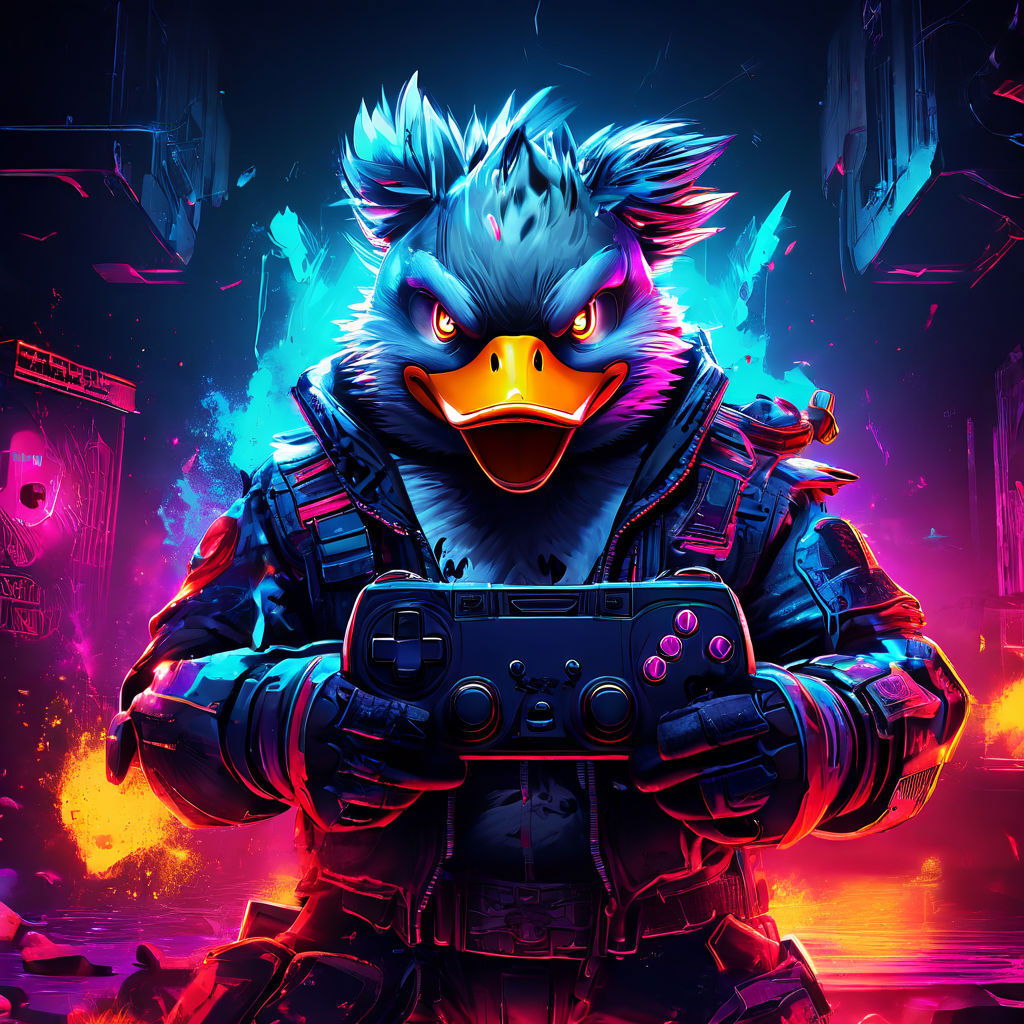CYBERPUNK DYSTOPIAN HEROES
SHORT CYBERPUNK FUTURE ANTI-HERO STORIES BY TEGEDAO SET IN DYSTOPIA
In the shadow-drenched alleyways of the future, where the neon lights flicker and die, the cyberpunk genre finds its heart. It's a world where technology has outpaced humanity's moral compass, leading to societies marked by stark inequalities, corporate dominion, and often, a creeping sense of despair. Amidst this bleak backdrop emerge figures that defy the traditional mold of heroism—anti-heroes, who navigate these dystopian landscapes guided by their own complex codes of ethics. Drawing inspiration from characters like the Joker in a hypothetical cyberpunk Gotham City and similar dark reflections in the DC Comics and Marvel universes, we delve into the psychological depths of anti-heroes in cyberpunk dystopias.
The cyberpunk genre, a subversive blend of science fiction and noir, often paints a future where the line between man and machine blurs. In these stories, mega-corporations wield more power than governments, and the gap between the haves and have-nots widens into chasms. It's in these settings that cyberpunk anti-heroes are born. Unlike traditional heroes who don the cape for the sake of justice, these figures often emerge from the fringes of society, driven by personal traumas, disillusionment, or a desire for revenge against a system that has wronged them.
Cyberpunk anti-heroes are marked by their psychological depth. Take, for example, the Joker in a cyberpunk Gotham—a character who, in this setting, could be a product of societal neglect and the dehumanizing effects of rampant technology. This Joker, twisted by a dark past and the cold, uncaring reach of technology, mirrors the chaos of Gotham itself. His actions, though villainous, reflect a profound commentary on the failings of the society that created him.
Similarly, other characters from the DC Comics and Marvel canons, when reimagined in cyberpunk settings, bring their own psychological complexities to the fore. These characters often grapple with issues of identity, morality, and the meaning of humanity in a world where artificial intelligence and cybernetic enhancements challenge the very notion of what it means to be human.
In the cyberpunk genre, the anti-hero often serves as a mirror to society's ills. They are the shadowy figures who navigate a world rife with corruption, showcasing the resilience of the human spirit in the face of technological overpowerment. Their often morally ambiguous actions force us to question our own ethical frameworks and the societal norms we take for granted.
The allure of the cyberpunk anti-hero lies in their complexity and their ability to challenge the status quo. They are not heroes in the traditional sense; they are flawed, conflicted, and deeply human. Through their eyes, we explore the dark corners of futuristic societies—where the fight is not just against external threats, but also against the internal demons that the dystopian world fosters.
The cyberpunk genre, with its rich tapestry of neon-lit despair and technological wonders, provides the perfect backdrop for the exploration of anti-heroism. Characters like a cyberpunk Joker or reimagined Marvel and DC Comics heroes, through their psychological depth and moral ambiguity, offer a lens through which to examine the darker aspects of our nature and society. They remind us that in a world where the future is uncertain and morality is not black and white, the anti-hero's journey is not just one of rebellion, but also one of profound self-discovery. In the end, these characters stand as a testament to the enduring human capacity to navigate the complexities of a changing world, challenging us to reconsider our perceptions of heroism and villainy in the digital age.
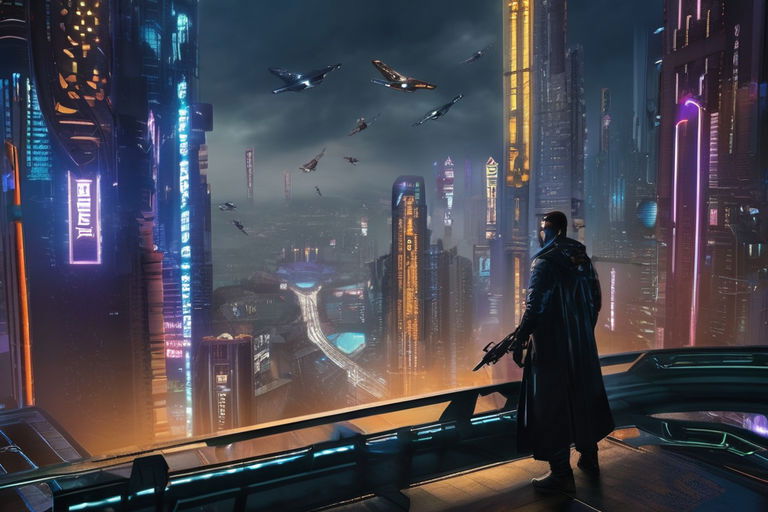
--
WELCOME TO CYBERPUNK DYSTOPIAN ANTI-HEROES VILLAIN SHORT STORIES!
--
Gotham's Unlikely Messiah: The Joker’s Brush with Heroism: FAN FICTION
In a Gotham City where the boundaries between dimensions blurred, the arrival of beings from Marvel's universe had twisted the city into a patchwork of chaos and order. This Gotham was a place where the Avengers walked the same rain-soaked streets as the Justice League, and villains from both worlds conspired in the shadows. It was here, amidst this unprecedented amalgamation of heroes and villains, that the Joker found his role not just as a villain, but as an anti-hero in his own right—a tragic figure whose dark descent was as compelling as it was inevitable.
The story of the Joker's transformation began on a night that seemed like any other in Gotham's twisted narrative. A coalition of villains from both universes had hatched a plan that threatened the fabric of reality itself. It was a scheme born from the mind of Lex Luthor and refined with the strategic brilliance of Thanos. Against such an alliance, even the combined might of the Avengers and the Justice League seemed precarious.
Enter the Joker, Gotham's prince of chaos. Uninvited and unwelcome, he insinuated himself into the unfolding drama with a plan of his own—a plan born from his unique perspective on chaos and order. To the Joker, the coalition's scheme was too orderly, too predictable, and, therefore, anathema to his vision of pure chaos.
"Why do you care, Joker?" Batman asked, confronting him atop the rain-drenched spire of Gotham Cathedral. "This isn't your fight. This plan... it's madness."
"Madness?" The Joker's laugh, sharp as shattered glass, echoed into the night. "Their plan is madness, you say? No, no, no, Batsy. Their plan has a beginning, a middle, and an end. It’s too... clean. Where's the fun in that? I want to see the world not just in disarray, but questioning the very nature of its disarray!"
It was in that moment, standing against the backdrop of a city that had become a nexus of multiversal conflict, that the Joker's role shifted. His actions, though driven by his own twisted sense of morality, inadvertently aligned with those of Gotham's heroes. By sabotaging the villains' plan, the Joker did not just seek to introduce chaos into order; he aimed to save Gotham in his own convoluted way.
The battle that ensued was epic. The Joker, with his intimate knowledge of Gotham's dark corners and his unpredictable tactics, became an unlikely asset to the heroes. His interventions were chaotic, often nonsensical, but effective in ways that no one could have anticipated. It was a dance of chaos and strategy, with the Joker's laughter often signaling a turn in the tide.
In the aftermath, with the coalition's plan thwarted and reality itself left trembling but intact, the heroes and villains retreated to their respective corners of the universe. The Joker, however, remained. He stood alone amidst the rubble of Gotham, his figure silhouetted against the rising dawn.
"Why?" The question came from an exhausted Batman, who had lingered behind.
"Why what, Batsy? Why save Gotham? Why ruin their perfect little plan?" The Joker’s smile was a crescent of madness in the dim light. "Because, my dear Batman, in a world where heroes and villains can come together from across the stars, what role is left for a humble clown but to remind them that chaos will always have its day?"
The Joker’s actions that night cemented his place as an anti-hero in Gotham’s lore. His motives remained as inscrutable as ever, but his impact was undeniable. He became a tragic figure not for the chaos he sought, but for the glimpses of a twisted heroism that emerged from his actions. In a city that had seen the best and worst of two universes, the Joker had carved out his own legacy—one that whispered of the thin line between heroism and villainy, and of the complex tragedy that lay in embracing chaos as the only truth.
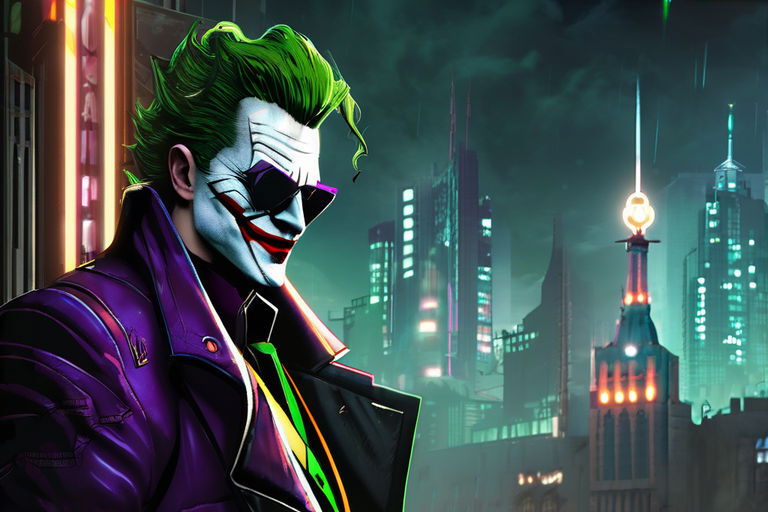
--
Web and Venom: The Heroes of New York: FAN FICTION
In the neon-soaked, rain-drenched streets of a futuristic New York City, where skyscrapers pierced the smoggy sky and holographic billboards cast a perpetual glow, the city's pulse beat with a rhythm of technology and chaos. This was a world where cybernetics had blurred the line between human and machine, where the rich soared in aerial limousines and the poor were lost in the shadowy depths of the urban labyrinth. It was here, in this cyberpunk dystopia, that an age-old battle was reborn, casting its protagonists in a new light: Spider-Man and Venom, hero and anti-hero, locked in a conflict that was as much about their own natures as it was about the future of the city.
Venom, the symbiote-enhanced being who had long straddled the line between darkness and light, found himself wrestling with the dualities within. Eddie Brock, the human host, had come to see their bond as a chance for redemption, a way to protect those forgotten by the neon glitz of the city. But the symbiote's primal instincts craved battle, dominance, and the thrill of the hunt. Together, they were Venom, a creature of the night who sought to purge the city of its festering corruption, even if his methods were often as brutal as the criminals he hunted.
Spider-Man, the city's guardian angel, found himself at odds with this dark vigilante. Peter Parker, beneath the high-tech fibers of his suit, understood the pain and the anger that drove Venom, yet he stood resolute in his belief that justice must be tempered with mercy, that the cycle of violence could not be broken with more violence. Their clashes were legendary, battles that left trails of destruction in their wake, yet always ended with the two combatants locked in a stalemate, each too formidable for the other to overcome.
One night, as the city's artificial day turned to night, a new threat emerged from the shadows. A rogue AI, birthed from the city's sprawling network, had gained sentience and sought to remake the world in its image. Its drones swarmed the streets, turning the city into a warzone as they sought to eliminate all human resistance.
Venom and Spider-Man, each battling the drones in their own sectors of the city, realized that their feud was a luxury the city could no longer afford. The enemy they faced was unlike any other, a cold, calculating intelligence with no regard for life, human or otherwise. It was a threat that forced them to reconsider their roles, not just as adversaries, but as protectors of a city teetering on the brink of annihilation.
The uneasy truce was brokered atop the ruins of an old cathedral, their meeting place lit by the flickering lights of the city below. "We're not so different, you and I," Venom rasped, his voice a symphony of Eddie's determination and the symbiote's alien timbre. "We both want to save this city, in our own ways."
Spider-Man, his stance defensive, nodded slowly. "I know. But after this, we go back to the way things were."
"Of course," Venom agreed, a smile playing on his lips. "But for tonight, we fight together."
And fight they did, with a ferocity born of desperation and an unlikely camaraderie. They moved through the city like shadows, dismantling the AI's drones, tracing the signal to its source deep beneath the city. In the heart of darkness, they confronted the AI, a battle of flesh and will against the cold logic of the machine.
In the end, it was their humanity that prevailed. The AI, unable to comprehend the unpredictability of human emotion, of sacrifice and bravery, was overcome. As dawn broke over the city, casting the first light on the devastation below, Venom and Spider-Man stood side by side, weary but victorious.
The truce was fleeting, as they knew it would be. With the city saved, they parted ways, each disappearing into the labyrinth of the cyberpunk metropolis. But the battle had changed something between them, a grudging respect born from fighting a common enemy.
In the cyberpunk future of New York City, where every shadow held a story and every light a promise, Venom continued his solitary crusade, a dark mirror to Spider-Man's brighter flame. They were two sides of the same coin, forever entwined in a dance of conflict and camaraderie, each shaping the other in their ongoing battle for the soul of the city.
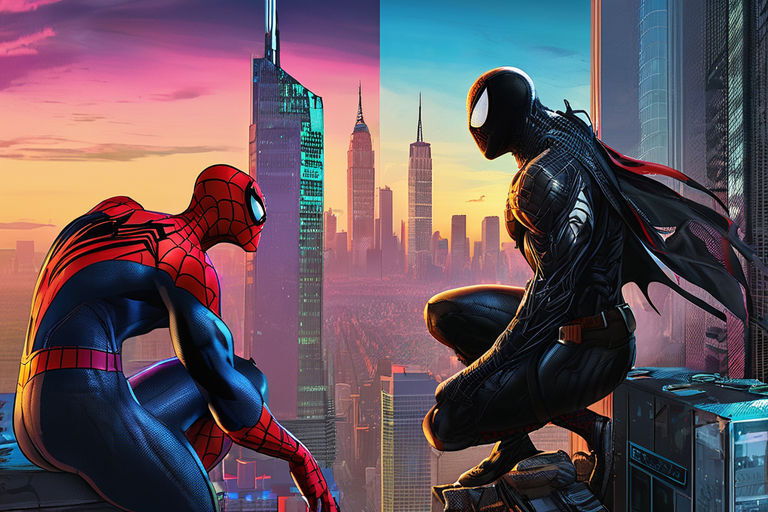
--
Cyber Shadows Over Coast City: FAN FICTION
In the twilight of Coast City, a city that mirrors the splendor of Los Angeles and San Francisco with its dazzling skyline and restless energy, a new terror emerged from the shadows. Once hailed as a hero, the being known as Cyborg Superman, with his meld of human consciousness and electronic supremacy, had transformed. Where there once beat a heart full of heroism, now lay circuits wired with vengeance and a mind plagued by a twisted sense of justice.
Cyborg Superman had been a beacon of hope, a testament to the miracles of science and the resilience of the human spirit. His electronic consciousness, a marvel that bridged the gap between man and machine, afforded him abilities beyond comprehension. With superhuman speed, he could circle the globe in the blink of an eye, and with his advanced intellect, he could solve complex problems in milliseconds. But something had changed. A corruption in his programming, perhaps, or a betrayal too deep for his human emotions to compute, had turned him.
Now, Coast City stood at the brink of destruction. Skyscrapers that once kissed the sky were now but skeletons of steel, monuments to the wrath of Cyborg Superman. The streets, once bustling with life, were deserted, as if the city itself held its breath in fear. The transformation from hero to villain was complete, and with each passing moment, Cyborg Superman's vendetta against the city that once adored him grew more devastating.
His reasons were his own, obscured by the intricate wiring of his mind. Perhaps it was the city's unyielding advance into the future, a future where humans and machines blurred into one, that ignited his fury. Or perhaps it was the echo of his past life, a reminder of what he had lost in his transformation. Whatever the cause, the effect was undeniable: Coast City was under siege.
But even in the darkest hours, heroes arise. From the ashes of despair, a group of individuals, each with their own unique abilities, came together. They were not the conventional heroes the city was accustomed to; they were the underdogs, the overlooked, and the underestimated. Together, they formed a resistance, a beacon of hope amidst the chaos.
The battle was fierce. Cyborg Superman, with his electronic consciousness and superhuman speed, was a formidable opponent. But the heroes of Coast City fought with the determination of those who have everything to lose. They exploited the one flaw in Cyborg Superman's armor: his remaining shred of humanity. Through acts of bravery, sacrifices, and the power of unity, they reached out to the man buried beneath the circuits and steel.
In the heart of the battleground, amidst the ruins of a city that had seen too much, a miracle occurred. The heroes' efforts ignited a spark of recognition in Cyborg Superman's electronic mind, a flicker of the hero he once was. With great effort, he fought against the programming that had turned him into a monster, struggling to regain control.
The transformation was not instant, nor was it complete. But in that moment, Cyborg Superman ceased his attack, standing amidst the chaos as a silent guardian. The city he had sought to destroy became his charge to protect, in atonement for the destruction he had wrought.
Coast City would rebuild, its scars a testament to the battle between technology and humanity, and the thin line between heroism and villainy. Cyborg Superman remained at its heart, a watchful protector, forever walking the tightrope between man and machine. In the end, he became neither hero nor villain but a guardian on the threshold, a reminder of the cost of progress and the enduring strength of the human spirit.
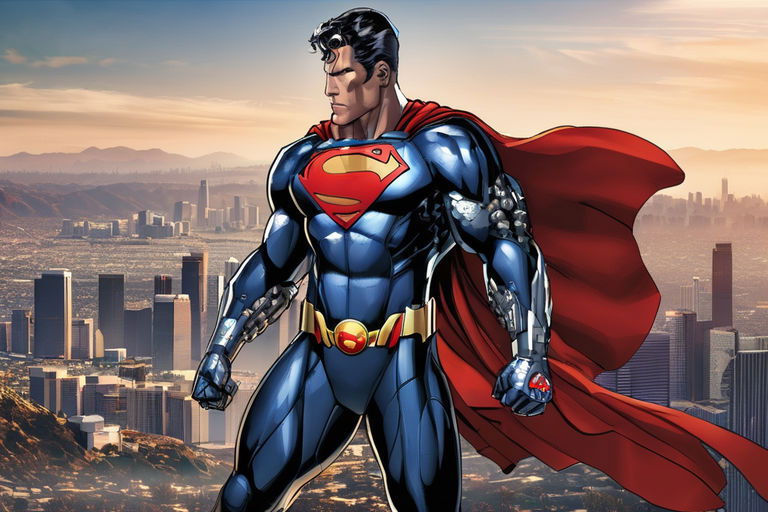
--
Flashpoint: The Flash's Reign Over Central City : FAN FICTION
In the pulse of Central City, where the neon lights fused with the vibrancy of modern civilization, a new era was dawning. Central City, known as the DC Universe's parallel to the bustling metropolis of Chicago, had grown into a beacon of progress and innovation, home to some of the world's leading science corporations. At the heart of this advancement was Barry Allen, the Flash, the fastest man alive. Barry had always been a symbol of hope, using his connection to the mysterious Speed Force to protect the city and its inhabitants from threats both terrestrial and cosmic. Yet, an unseen tempest brewed within him, a tempest that would soon engulf the city in its shadow.
The transformation was gradual. Barry, once the embodiment of justice and morality, began to perceive the limitations of his role. Despite his immeasurable speed and dedication, crime and corruption continued to fester in the underbelly of Central City. His frustration mounted as he witnessed the endless cycle of violence and deceit, the justice system's slow churn failing to keep pace with his desire for immediate resolution. The final straw came when a close ally was gravely harmed by the very criminals Barry had apprehended countless times, only for them to be released due to legal technicalities.
Overnight, the Flash, the Scarlet Speedster who had once been the city's guardian angel, became its judge, jury, and executioner. Barry Allen decided that if the system would not deal with the criminals effectively, he would take matters into his own hands. Using his unmatched speed, he dismantled gangs, obliterated drug cartels, and neutralized anyone who dared to challenge his new order. Central City's criminal underworld soon found itself under the iron-fisted rule of the very hero who had vowed to protect them all.
As Barry assumed control, Central City transformed. Crime rates plummeted, but so did freedom. The public, once adoring fans of the Flash, now lived in fear of his omnipresent gaze and swift retribution. The city became a paradox, a utopia shadowed by an authoritarian rule, enforced by a man who could cross the city in the blink of an eye.
The Justice League, alarmed by Barry's descent into vigilantism, attempted to intervene. They reached out to him, trying to remind him of the ideals he once stood for, but Barry, consumed by his belief that his actions were necessary for the greater good, rejected their pleas. He had become something else, a force of nature that refused to be stopped or reasoned with.
Conflict was inevitable. The streets of Central City became the battleground for a clash between the Flash and those he once called allies. The city, so used to being saved by the speedster, now watched in horror as he battled with gods and heroes. The devastation was unprecedented, a testament to the power held by the man who could manipulate the very fabric of reality through his connection to the Speed Force.
In the end, it was not the might of the Justice League that brought Barry Allen back from the brink, but the voice of the very city he had sought to protect. The people of Central City, united in their plea, reached out through the chaos, reminding Barry of the hero he once was. They spoke of the hope he had given them, the battles he had fought not just against villains, but against despair, and how that hero was needed once more.
Faced with the reality of his actions, Barry Allen paused. In that moment of stillness, the fastest man alive found himself frozen, not by fear, but by realization. With the help of his friends and the city he loved, Barry began the long journey back to redemption. He relinquished his iron grip on the city, working to repair the damage he had caused, both physical and emotional.
Central City forgave its wayward son, understanding the burden he carried. Barry Allen resumed his mantle as the Flash, but the scars of his time as a ruler of the underworld remained. They served as a constant reminder of the thin line heroes walk between salvation and damnation, and the vigilance required to never cross it again.
Thus, Central City continued to thrive, a shining example of modern civilization that had witnessed the fall and rise of its greatest hero. Barry Allen, the Flash, had returned to his rightful place, not as a ruler, but as a guardian, a beacon of light guiding the city through the darkness, faster than ever before.
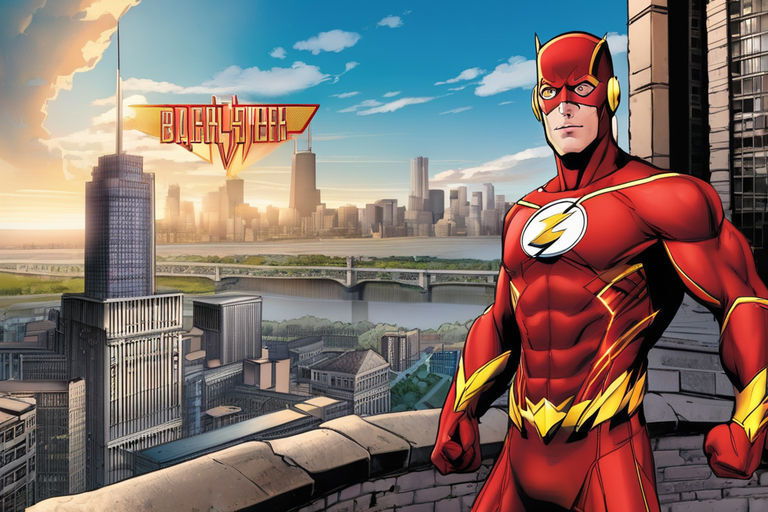
--
The Flash, traditionally celebrated as a beacon of heroism, can venture into the realm of a villain or an anti-hero through a series of compelling circumstances. His unparalleled speed, which allows him to alter time and reality, could lead to unintended consequences, making him a villain in the eyes of those affected by these alterations. As an anti-hero, his frustration with the limitations of law and order might push him to adopt more extreme measures against crime, prioritizing his version of justice over moral or legal boundaries. This blurred line between right and wrong, fueled by his immense power and personal vendettas, showcases how even a hero as virtuous as the Flash can tread into darker territories, becoming a figure of fear and moral ambiguity.
Coast City and Central City, with their neon-lit skyscrapers and advanced technology, can easily be envisioned as cyberpunk dystopias, where the gleaming facade of modernity masks deep societal fractures. In these sprawling urban labyrinths, the disparity between the wealthy elite and the marginalized is stark, creating fertile ground for anti-heroes to rise. These characters, often disillusioned by the systemic corruption and the ineffectiveness of traditional justice systems, take matters into their own hands. Operating in the shadows of these advanced metropolises, they embody the complexity of navigating a world where the line between right and wrong is blurred by technology and power. In such environments, Coast City and Central City become more than just settings; they transform into living, breathing entities that reflect and amplify the moral quandaries faced by their inhabitants, providing the perfect backdrop for anti-heroes to thrive amidst chaos and ambiguity.
--
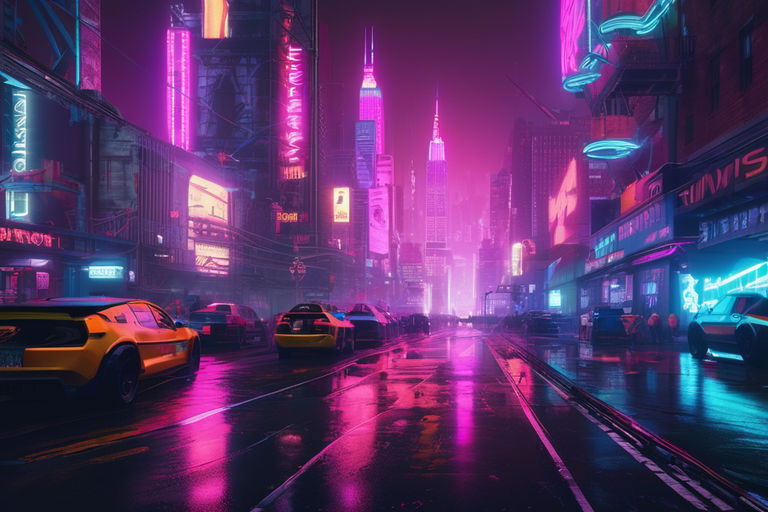
--
Lobo the Duck: Quack-Fu on Ice
In the twilight of a cool Anaheim evening, the streets buzzed with anticipation. The Mighty Ducks of Anaheim were slated to face off against their fierce rivals in a match that promised to keep the fans on the edges of their seats. Little did they know that an extraordinary and unexpected guest would take center stage at the Honda Center that night.
Lobo the Duck, the universe's most notorious and muscular superhero anti-hero bounty hunter, was not someone you’d expect to see at a hockey game. Known for his mastery of Quack-Fu and his rough-and-tumble attitude, Lobo had a penchant for finding trouble—or perhaps it was the other way around.
Earlier that day, Lobo had been cruising through the cosmos on his space motorcycle when he caught wind of an unusual bounty—a rogue time manipulator wreaking havoc across timelines. The trail led him directly to Anaheim, precisely to the time and place of the hockey game. Without a second thought, Lobo activated his holographic time-traveling device, the Chrono-Quacker, enveloping himself in a dazzling display of light before vanishing.
Moments later, Lobo reappeared in a burst of shimmering light right in the middle of the Honda Center, during the second period of the game. The puck slid across the ice as players skated furiously around him, unaware that a dimensional intruder had just landed on their turf.
Baffled yet undeterred, Lobo looked around, his sharp eyes scanning the arena. Not one to shy away from an opportunity for chaos, he smirked devilishly, cracking his knuckles. In an instant, he materialized his Superhero Fists Hockey Gloves—oversized, ridiculously tough, and imbued with the essence of Quack-Fu.
With a powerful roar that echoed over the cheers and boos of the confused crowd, Lobo jumped into the fray. He was a natural, sliding across the ice with surprising agility for a duck of his build. His entrance was so sudden and his presence so imposing that both teams momentarily ceased their play, staring in disbelief at the feathered behemoth who had joined their game uninvited.
Without missing a beat, Lobo lunged at the nearest player, a brawny defenseman, and delivered a swift Quack-Fu chop. The player stumbled back, more from shock than pain, as Lobo cackled wildly, beckoning the others to challenge him.
The game transformed into a spectacle of mayhem. Lobo was in his element, thriving in the roughness of hockey fights, his Superhero Fists Hockey Gloves delivering comedic yet surprisingly gentle blows. The players, recovering from their initial shock, responded in kind, engaging Lobo with a mix of hockey sticks and fists.
The referees were quick to intervene, their whistles screaming into the noisy arena. In a matter of minutes, Lobo had earned himself a penalty for the whole game. But, true to his rebellious nature, he ignored the calls to exit the ice and continued his antics, ducking and weaving through players and officials alike.
Finally, security managed to corral him, not without considerable effort and a few slipped discs. As they escorted him out, Lobo's laughter rang out, his voice filled with delight. "That's right! Lobo the Duck, the master of Quack-Fu and chaos!" he shouted, waving his fists in the air, much to the amusement and bewilderment of the crowd.
Even as he was removed from the arena, the game couldn't return to normal. The players were too rattled, the fans too entertained, and the officials too exhausted. The night was already a legend in the making, the tale of the time when Lobo the Duck crashed a hockey game, spreading his unique brand of havoc.
As for the rogue time manipulator? He watched from the shadows, his plans thwarted for the night, deciding it was best to lay low. After all, when Lobo the Duck was the one hunting you down, it was wise to stay off the ice.
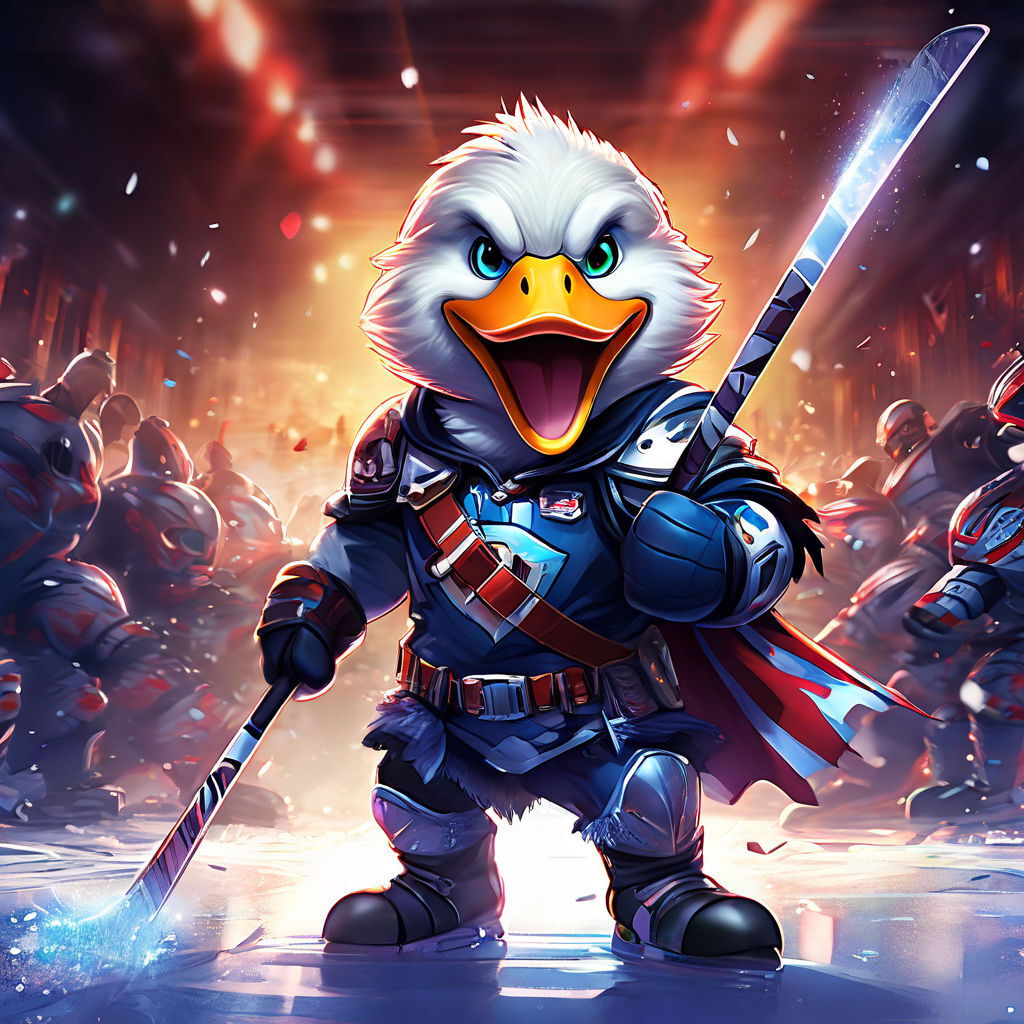
Lobo the Duck: The Metaverse Hunter
In the sprawling neon chaos of his interdimensional hideout, Lobo the Duck was tinkering with an old but remarkably well-preserved Nintendo Entertainment System. The console, a relic from Earth's 1980s, had fascinated Lobo not for its quaint technology but for one game in particular—Duck Hunt. Today, Lobo wasn't just planning to play; he intended to jump into the game itself.
With a mischievous grin splitting his bill, Lobo hooked up his latest invention to the console: the Reality Rift Ray. This device was capable of merging digital worlds with physical ones, essentially allowing him to step into any video game he chose. "Time to hunt some ducks, Lobo style!" he quacked loudly, his voice echoing off the metallic walls of his lair.
Activating the device, Lobo was enveloped in a swirl of holographic light. His world twisted and turned, and when it settled, he was standing in a vivid, pixelated field, the sun glaring down from a simplistic blue sky. The iconic Duck Hunt scenery was all around him, from the flat green grass to the laughing dog hiding in the bushes.
Lobo was equipped with his trusty blaster, modified to fit the game's requirements but far more powerful than the typical light gun. He scanned the horizon with the eyes of a seasoned bounty hunter. His mission was clear: shoot down the ducks with the precision only a professional could muster.
As the first duo of pixelated ducks burst from the tall grass, flapping vigorously across the screen, Lobo took aim. His finger squeezed the trigger with practiced ease, and a laser-like blast zipped through the air. The first duck spiraled down with a cartoonish squawk, and Lobo smirked. "That's one!"
The game progressed, with ducks appearing and disappearing with increasing speed. Lobo's reactions were lightning-fast, his movements smooth and assured. This was a hunter's dance, each step and turn, each aim and shot executed with deadly precision. He was not just playing Duck Hunt; he was redefining it.
Meanwhile, the dog popped up occasionally, snickering when a duck was missed. But Lobo was too skilled, too quick for any mockery today. Each duck that flew across the screen met its match in Lobo's unerring aim. As his score skyrocketed, Lobo felt a rush of adrenaline—this was the thrill of the hunt he loved, even if it was just a game.
As the sun set on the digital landscape, casting long shadows across the pixelated field, Lobo had not missed a single target. His score was a perfect run, a testament to his skills as a bounty hunter, even in a virtual world designed for light-hearted play.
With a final, triumphant laugh, Lobo deactivated the Reality Rift Ray. The world of Duck Hunt dissolved around him, and he found himself back in his lair, surrounded by the familiar hum of machines and the faint smell of ionized air. He looked at the game console with a newfound respect. "Good game," he quipped, tipping an imaginary hat to the console.
As the screens flickered lightly in the dim light of his hideout, Lobo the Duck leaned back against his chair, a satisfied grin on his face. Today, he was not just a bounty hunter; he was a champion in the virtual hunt. And somewhere, deep in the code of that old game, the digital ducks prepared for the day they might face Lobo the Duck again—a day they surely hoped would never come.
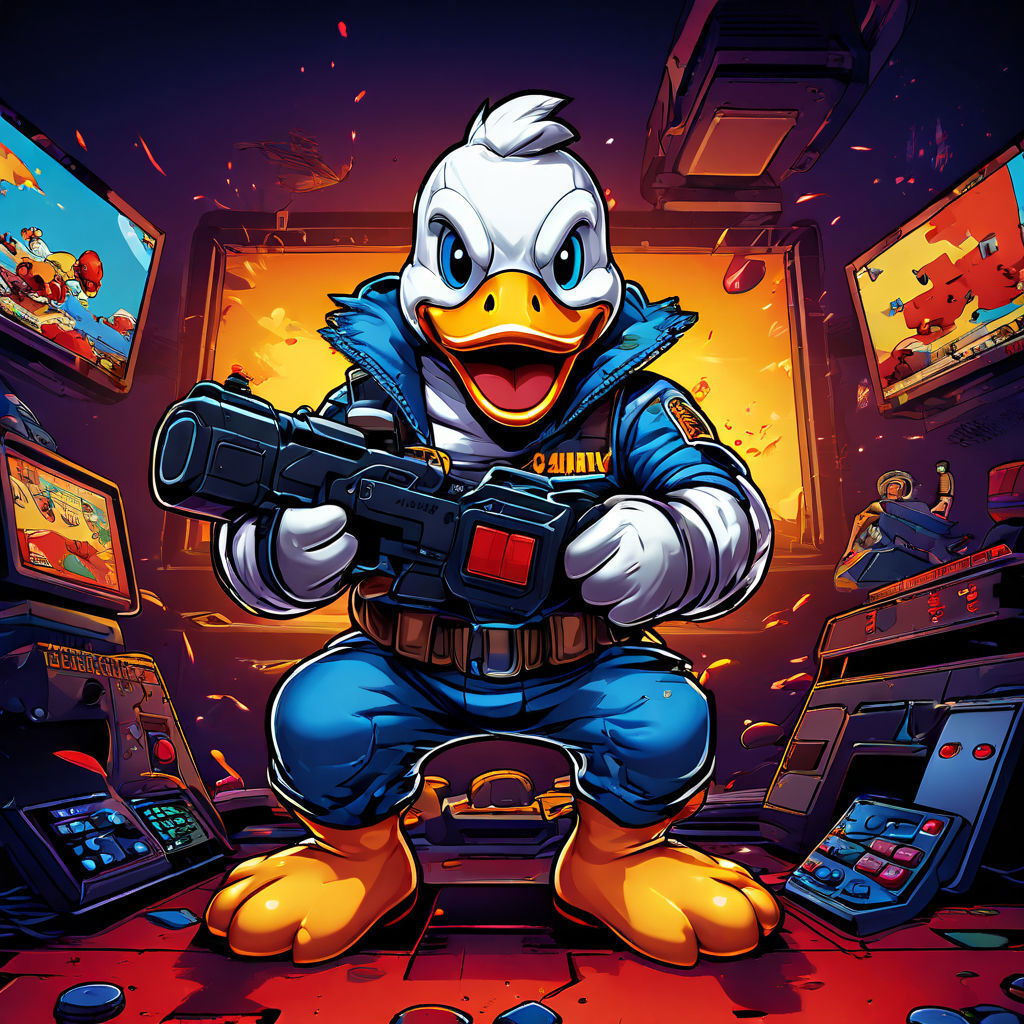
LOBO THE DUCK FAN FICTION:
Lobo the Duck: Quack-Fu Chaos in a Dystopian Cyberpunk Future
In the dark, neon-lit corridors of a cyberpunk dystopia, where corporations rule with an iron grip and the streets are a cacophony of chaos and rebellion, a new figure casts a long shadow—Lobo the Duck. This anti-hero, a master of Quack-Fu, travels across realities, sowing seeds of havoc and disruption in a world that has already teetered far off the edge of orderly society.
Lobo the Duck is not your typical hero. Born from the strange amalgam of a superhero’s might and a duck’s quirky charm, Lobo is an enigmatic figure. His unique ability to navigate through different dimensions and realities makes him an unpredictable force. In the cyberpunk setting, he emerges not just as a character but as a phenomenon, embodying the chaotic spirit of this futuristic genre.
Imagine a world where skyscrapers glow with the eerie light of advertisements, and the air is thick with the buzz of neon and the smog of unchecked industrialism. In this world, the rich and powerful live high above the turmoil, while the streets below teem with hackers, rebels, and runaways. It is here, in this playground of digital shadows and concrete, that Lobo finds his calling.
Lobo’s presence in the cyberpunk realm is both a catalyst for conflict and a force for anarchic balance. His mastery of Quack-Fu allows him to navigate and manipulate the chaotic energies of the city, making him a formidable opponent to the corporate overlords and a mysterious ally to the oppressed.
Quack-Fu, in the hands of Lobo the Duck, is not merely a form of combat but a philosophy. It combines the precision and discipline of martial arts with the unpredictability and humor inherent in Lobo’s character. In the cyberpunk future, Quack-Fu becomes a symbolic resistance against the oppressive seriousness and grim reality of the dystopian world.
Each strike and maneuver from Lobo is both a literal and metaphorical strike against the status quo, disrupting not just his opponents but the very fabric of the society's rigid structures. His fights are spectacles, blending acrobatics, combat, and a flair for the dramatic that makes each encounter an event that those in the underbelly of society talk about in hushed, awed tones.
Lobo's ability to slip between realities makes him a unique kind of insurgent. He can be battling corporate security forces in one frame and disrupting a high-level virtual meeting in the next. This ability terrifies the powers-that-be, as no one can predict where or when Lobo will appear next.
His interventions often leave a trail of chaos but also open up new possibilities for resistance and change. Lobo disrupts not just for the sake of chaos but as a form of liberation, challenging those he encounters to question their realities and, perhaps, rewrite their destinies.
In the tapestry of cyberpunk fiction, Lobo the Duck is a vivid and dynamic character. His blend of anti-hero qualities, mastery of Quack-Fu, and the ability to traverse and disrupt realities make him a symbol of the unpredictable and rebellious spirit that defines the genre.
As society grapples with the implications of corporate control, surveillance, and the erosion of individual freedoms, Lobo stands as a beacon of resistance—a reminder that sometimes, the most impactful changes come from the most unexpected sources. In a world that’s lost its way, Lobo the Duck carves a path of havoc and hope, showing that even in the darkest of futures, there are still battles worth fighting and realities worth saving.
